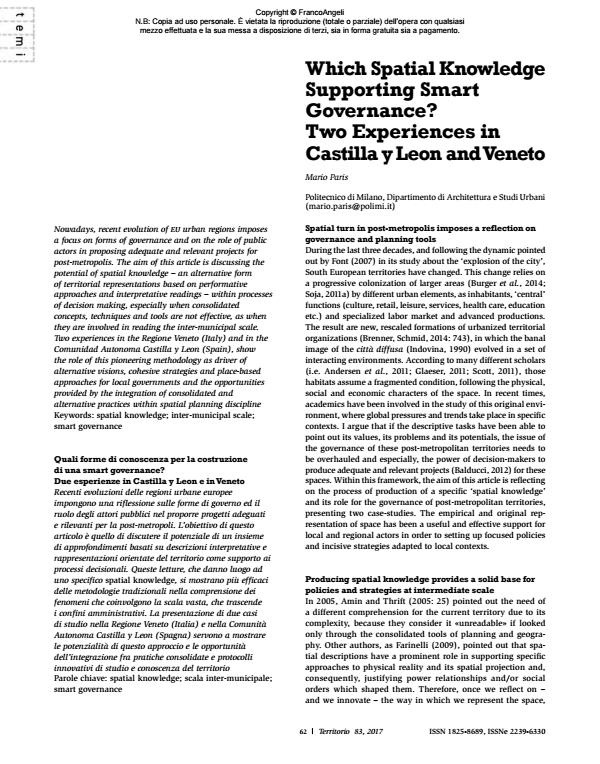Which Spatial Knowledge Supporting Smart Governance? Two Experiences in Castilla y Leon and Veneto
Journal title TERRITORIO
Author/s Mario Paris
Publishing Year 2018 Issue 2017/83
Language English Pages 6 P. 62-67 File size 182 KB
DOI 10.3280/TR2017-083008
DOI is like a bar code for intellectual property: to have more infomation
click here
Below, you can see the article first page
If you want to buy this article in PDF format, you can do it, following the instructions to buy download credits

FrancoAngeli is member of Publishers International Linking Association, Inc (PILA), a not-for-profit association which run the CrossRef service enabling links to and from online scholarly content.
Nowadays, recent evolution of eu urban regions imposes a focus on forms of governance and on the role of public actors in proposing adequate and relevant projects for post-metropolis. The aim of this article is discussing the potential of spatial knowledge - an alternative form of territorial representations based on performative approaches and interpretative readings - within processes of decision making, especially when consolidated concepts, techniques and tools are not effective, as when they are involved in reading the inter-municipal scale. Two experiences in the Regione Veneto (Italy) and in the Comunidad Autonoma Castilla y Leon (Spain), show the role of this pioneering methodology as driver of alternative visions, cohesive strategies and place-based approaches for local governments and the opportunities provided by the integration of consolidated and alternative practices within spatial planning discipline
Keywords: Spatial knowledge; inter-municipal scale; smart governance
- Quale cooperazione intercomunale fuori dalle città metropolitane? Il percorso di riconoscimento dell'IPA veronese come laboratorio per il governo dell'area vasta Mario Paris, Antonio Casella, in ARCHIVIO DI STUDI URBANI E REGIONALI 123/2018 pp.76
DOI: 10.3280/ASUR2018-123004
Mario Paris, Which Spatial Knowledge Supporting Smart Governance? Two Experiences in Castilla y Leon and Veneto in "TERRITORIO" 83/2017, pp 62-67, DOI: 10.3280/TR2017-083008